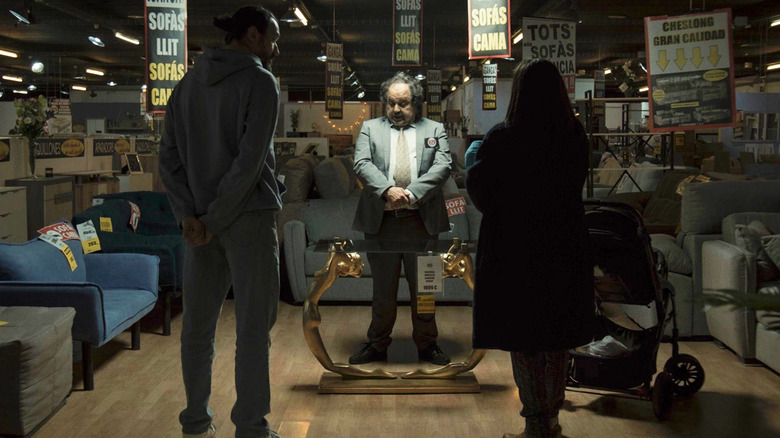Realistically, when you’ve just had a new child, it’s not the time to be buying a new coffee table. It’s more of a time to be economising and also child-proofing your furniture. But try telling that to Jesús (David Pareja), who, over the objections of his wife María (Estefanía de los Santos) drops ludicrous money on a ludicrously garish table, with a little help from the sales technique of a very slimy furniture shop rep (Eduardo Antuña). Perhaps Jesús is simply trying to impress his brother and his brother’s much-younger, vegan girlfriend, since they’re coming over for a dinner party that very night.
In any case, while María heads out to pick up some wine, Jesús finds himself alone in the flat and disaster soon strikes. In the madness of the moment, he decides not to let on that anything is wrong, and so, the dinner party plays out in half-farce, half-Pinteresque fashion with Jesús’ increasingly desperate attempts not to let on that anything is wrong.
Director/co-writer Caye Casas (Killing God)’s comedy The Coffee Table turned many heads upon its release because, quite simply, it is one of the most appallingly morbid things you’ll have seen in years and years. It is also bizarrely, derangedly funny. It reminds one of madness – the madness of one who has seen horrors so unspeakable they can only laugh. The Coffee Table is a hard film to recommend to others – indeed, it’s a hard film even to watch, let alone to love – but it is a fascinating and commendably bold piece, a “horror” movie in a way that descriptor is almost never used.
Second Sight’s excellent rerelease of this recent (2023), much-hailed, and widely-acknowledged dark comedy comes with a fairly impressive collection of extras. There is no Spanish-language commentary with any of those involved with the making – though there are plenty of interviews to make up for that – but we do get an English-language commentary with two critics, both of them specialists in horror and dark cinema in general, Zoë Rose Smith (Zobo With a Shotgun) and Amber T (writer for Fangoria, among others). Both have been presences on past genre releases from Second Sight, and the two have a nice rapport – if you’re looking for behind-the-scenes anecdotes or deep critical analysis you’ll have to look elsewhere, but there’s a simple pleasure in hearing two friends – for that is how they come off, in any case – discuss a film with knowledge and wit.
As for the interviewers, director Caye Casas shows up for “What Scares Us the Most”, talking us through the film’s pre-production – including the difficulty in sourcing a coffee table “aesthetically hideous” enough to work – and its unusually economic ten-day shooting schedule. Actors David Pareja (Jesús) and Estafanía de los Santos (Maria) are interviewed in “A Sensory Journey” and “We Are All Nuts”, respectively, while “Natural Oppression” features Alberto Morago, Director of Photography. All have nothing but praise for the director and the experience of making the film. There is also a video essay analysing the film through the lens of mental health and gender rôles, “Postpartum” by Rebecca Sayce. The essay is reasonable, if a little pedestrian, but there are several moments in which Sayce trips over her words – natural enough, but did Second Sight’s budget not stretch to second takes?
In any case, the biggest treat here has to be two prior short films by Caye Casas, 2014’s “Nada S.A.” (“Nothing C. O.”) and 2017’s “R.I.P.”. “Nada S.A.” features a wonderfully comic performance by Emilio Gavira, a Casas regular who also has a voice-only rôle in The Coffee Table, as a man who takes on a highly unusual position: he is paid to literally do nothing. He must sit in a small chair in an empty warehouse for the entire day, ten hours a day, forbidden to get up, to eat, to sleep, or to do anything at all, on pain of being fired. It’s a beautifully Kafkaesque satire and, interestingly, is listed on IMDb as having a feature remake in development, though no other details are given. “R.I.P.” is the lesser short here, but it’s a blood, guts and black humour good time as a put-upon, dying husband (Josep Maria Riera) submits to the demands of his harpy of a wife (Itziar Castro), before things end up in some wildly unexpected places. Both shorts, hard to find otherwise, are excellent reasons to pick up this release, especially if you missed the main feature on its initial release.

